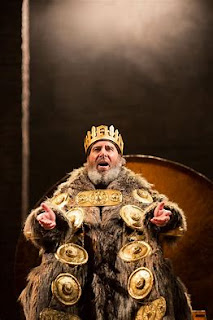Creativity vs Tyranny
Fortunately for us all, the mind works in ways we cannot understand. A condition like OCD has rules that are uncomfortable to follow. If you are able to follow the rules and live with the temporary discomfort they bring about you can come out the other side; you can walk on like Adam and Eve at the conclusion to Milton's Paradise Lost because you now have that elusive perspective, that knowledge that the discomfort will be temporary if you follow the rules. I mention Milton because, like the Earth that is there for the fallen Adam and Eve, Paradise Lost was still there for me when I was discharged from the hospital. The poem was open to me in the same way that the world of James Joyce would open up to me in the years to come. Is art, then, separate from "real" life? Only if we choose to make that arbitrary distinction. To me the worlds of Ulysses and Finnegans Wake and Paradise Lost ARE real life, realer than real life, in fact. The mysteries contained within these worlds are such that a life spent studying them and trying to unravel them is a life well spent.
In the concluding book of Paradise Lost, Milton writes of liberty, once freely given by God to the unfallen Adam and Eve, as something that mankind must now fight for:
since he permits
Within himself unworthy powers to reign
Over free reason, God in judgment just
Subjects him from without to violent lords
(Paradise Lost, Bk XII, ll. 90-93)
I can't help but read the above lines through the lens of obsessive thoughts and the tyranny they exert upon people's minds. As Milton sees it, mankind entered into a relationship with earthly tyranny at the moment of that first disobedience by Adam and Eve. Mental clarity and peace of mind are no longer a given for human beings. This makes me think about order and beauty and how we find any peace of mind in this fallen world. The organic architecture of Frank Lloyd Wright seems to me to be founded on a belief that human beings thrive when they have beauty and creativity all around them. Making and appreciating art is a way to work through and process the tyrannies we experience in our lives - be they obsessive thoughts, traumas, bereavements, or PTSD to name but a few. I found that by writing about OCD in my novel I was able to think about it in fresh ways and learn to appreciate some of the positives that have come out of learning to live with the condition.
I think my interest in both Miles Davis and William Faulkner is partly due to their restless innovation and a shared unwillingness to play it safe and simply provide people with tried and tested formulas. I feel that the same relentless desire (or need) to create powers both of these artists. Davis' music works on my mind in ways that I cannot analyse or understand; it taps into my own creativity and fires the synapses; it gives me ideas that are seemingly without origin. Experiencing a great artist at the peak of their creative powers is inspiring, thrilling, and highly therapeutic.
I believe in creativity as an antidote to tyranny and repression. This is the dominant theme of my novel, 'Myself am Hell'. My central character, Quentin Carter, is a creative soul who battles with OCD throughout the novel and beyond. Frank Lloyd Wright, James Joyce, Miles Davis, John Milton, and William Faulkner are the cultural titans who inspire him and stand with him in his battle with OCD.







Comments
Post a Comment